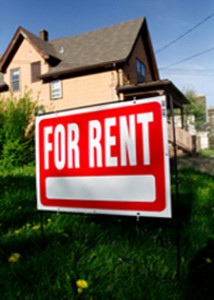Posted by Teresa on May 2, 2011 under Lease and Rental Agreements, Tenant Screening & Background Checks | 
 We’ve often advocated that screening tenants begins with placing your For Rent ad. It should continue with the phone conversation you have with prospective tenants when they call in response to your ad.
We’ve often advocated that screening tenants begins with placing your For Rent ad. It should continue with the phone conversation you have with prospective tenants when they call in response to your ad.
But what exactly should a landlord ask each prospective lease applicant to avoid the tire-kickers and those whose credit and rental history make them ineligible to lease the property? Here are a few suggestions for questions to ask before showing your vacant rental units:
- Where do you live now?
- Are you currently renting?
- Why are you moving?
- How many people will be living with you?
- What kind of reference will your current landlord give you?
- What kind of reference will your previous landlords give you?
- What kind of work do you do?
- What types of pets do you have?*
- How many people who will be living in this unit are smokers?*
- We run credit and criminal background checks on every lease applicant over the age of 18. Will there be any issues there?
- We require a lease application and a fee to cover the background and credit check for each tenant over 18. Is there any problem with that?
- When do you want to move in?
- Will you have the first month’s rent and security deposit ready if we sign a lease?
- Do you have any questions about the process or the rental unit?
- Do you have a problem with any of these requirements?
*Asking “how many” rather than “do you have pets?” or “does anyone smoke?” often elicits an honest answer. If you do not allow pets or smokers, you’ve just eliminated the applicant.
Depending on the answers you get, the interested party may decide you are not the landlord for him or her. And you may decide they are not the tenant for you. Either way, you’ve saved your valuable time by avoiding showing the rental unit and going through the lease application process.
Posted by Teresa on April 8, 2011 under Landlord Tips, Marketing for Landlords | 
 How a landlord advertises rental property is the first step in signing a lease with the best possible tenant. If you want a tenant who pays rent on time, takes care of your property and doesn’t cause any trouble, you can start that process when you place your ads.
How a landlord advertises rental property is the first step in signing a lease with the best possible tenant. If you want a tenant who pays rent on time, takes care of your property and doesn’t cause any trouble, you can start that process when you place your ads.
What to Include in a For Rent Ad
First you have to decide the basics: how much rent you’ll charge, the length of the lease, how many people your rental unit can accommodate, whether pets will be allowed and the requirements tenants must meet to qualify for a lease.
Once you’ve determined these factors, you can write your ad. Include the following:
- Number of bedrooms and bathrooms.
- Location.
- Special features, like hardwood floors, washer and dryer, water view, or proximity to trails or parks.
- Size and type of pets allowed, if any.
- Website to view photos and find additional information.
- How to contact you. Include a mobile number.
- The rent, security deposit and any other requirements that will help you screen out less-than-desirable tenants. For example, let readers know up front that you will be ordering tenant credit checks and background checks on all applicants.
What not to include:
Any language that can be considered discriminatory. Don’t mention that your rental unit is best for singles, families, elderly, young people, or those of a certain religion. Even mentioning that it’s located near a church can be interpreted that you expect to rent to church-goers.
Once you’ve placed the ad, try not to allow calls to roll to voice mail. People are impatient these days and may not leave a message or call you back.
Posted by Teresa on April 6, 2011 under Lease and Rental Agreements | 
 The utilities section in a property lease is one of the most important. It stipulates who is responsible for the utility bills associated with the rental property. Failing to specify which utilities the tenant will be responsible for can cause headaches and financial loss to the landlord.
The utilities section in a property lease is one of the most important. It stipulates who is responsible for the utility bills associated with the rental property. Failing to specify which utilities the tenant will be responsible for can cause headaches and financial loss to the landlord.
Determining who’s responsible for the unit’s utilities—and having a signed agreement—is important because it protects both the landlord and the tenant. Each utility company has different ways of handling rental properties. Once you know how things work in your area, decide which arrangement works best for your situation; there are many options, including:
- In single-family rental houses, tenant pays all utilities directly to the provider
- Landlord pays for utilities that can result in liens against property if unpaid
- Tenant pays for everything except sewer and water
- Landlord pays utilities and has tenants reimburse him
- Landlord pays only for utilities the building owner is responsible for
- Tenants pay for anything that is metered to their unit; utilities with shared meters (usually water and sewer) are paid by landlord and built into the rent
- Landlord pays for garbage and recycling pickup only
Once you determine which arrangement works best, draft your this section of the rental agreement stating that the tenant is responsible for all utilities except for those (specify them) the owner will be paying. Also include language that the tenant agrees to make the payments through the term of the lease and nonpayment will be considered a breach of the agreement. State that any past due utility bills may be paid by the owner and will be charged to the resident, along with applicable fees.
As part of your due diligence before you sign the lease, check with the utility companies to be sure the tenant qualifies for an account in his or her name. Outstanding bills may prevent this—if you sign a lease with a tenant who cannot get the utilities in their name, you’ve just wasted a lot of time working with a tenant who won’t be moving into your rental property.
Finally, most landlords we know have utilities revert to their name between tenants.
Posted by Teresa on March 31, 2011 under Landlord Tips | 
 So, you’ve landed a new tenant for that vacant rental you’ve been showing. He paid the deposit, and you’re in the tenant background check phase of your due diligence process. Now you can take down the flier you posted at the local coffee shop, stop showing the unit and cancel your ads, right?
So, you’ve landed a new tenant for that vacant rental you’ve been showing. He paid the deposit, and you’re in the tenant background check phase of your due diligence process. Now you can take down the flier you posted at the local coffee shop, stop showing the unit and cancel your ads, right?
Sure, if you’re betting that the deposit check won’t bounce, the tenant credit report will come back at an acceptable level and the tenant’s references will all check out. But smart landlords know that anything can happen between the lease application and the lease signing. Tenants change their minds every day. References don’t check out. And credit scores are more iffy than ever these days. Maybe showing the rental property to additional prospective tenants is the better way to go.
Every landlord should have a back-up plan, just in case the shiny new tenant doesn’t prove to be 100% reliable. Besides, unless and until you have a signed lease, you don’t really have a new tenant.
There are several advantages to continue marketing a pending rental property:
- You’ll have prospects for your additional rental properties.
- Murphy’s Law says that as soon as you stop marketing one rental property, another one will become vacant!
- You can refer your prospects to other landlords in your network.
- A waiting list can move a hesitant tenant from “just looking” to “where do I sign?”
- You might find a better-qualified tenant than the one you’re working with.
Some landlords would say that “never” is when they stop marketing their rental properties. As in any profession, being proactive is better than being reactive in the rental property business. No matter how good a prospective tenant looks, make sure you have a back-up plan. Keep marketing and showing your rental unit and gather names for a waiting list—just in case the deal falls through.
Posted by Teresa on March 11, 2011 under Tenant Credit Checks | 
 What should a landlord do when a potential tenant states they have had their credit report pulled recently and therefore, there’s no need to run another credit report for their lease application? Should they accept the applicant’s report and save the time and trouble?
What should a landlord do when a potential tenant states they have had their credit report pulled recently and therefore, there’s no need to run another credit report for their lease application? Should they accept the applicant’s report and save the time and trouble?
In a word: no. Some tenants might be trying to save money and might not see the need for another credit report. Or, they may want you to know up front that their credit score is low; in this case you can make a decision to continue with your own report or reject their lease application.
And then there are those who fabricate their own credit reports, which happens every day to landlords and others who aren’t as cautious as they should be. Fake credit reports are widely available, so don’t make the mistake of accepting any credit report other than one from a trusted service provider.
Smart landlords don’t run their rental property business on guesswork. To really know who you’re renting to, always reinforce your policy that a credit and background check will be conducted on every tenant applicant.
If, after hearing you won’t accept their credit report, the potential tenant is no longer interested in your rental property, you might have dodged a bullet.
Of course, there are exceptions to every rule! In some states, landlords must accept a potential tenant’s credit report if it is no older than 30 days. Other states have legislation that a credit bureau must forward an existing credit report whenever the tenant applies for a lease within 30 days. These laws are designed to prevent tenants from incurring high fees from repeated applications.
Landlords have the right to protect their business interests by leasing to qualified tenants. Make sure yours are qualified by conducting a thorough credit and background check on each one–even if they have one in their pocket for you!
Posted by Teresa on January 11, 2011 under Landlord Tenant Lawsuits, Tenant Screening & Background Checks | 
 You’re probably familiar with the news story about a house in Escondido, CA, where the resident is accused of making bombs and plotting bank robberies. Because of danger to neighbors, the decision was made to burn the house completely to the ground.
You’re probably familiar with the news story about a house in Escondido, CA, where the resident is accused of making bombs and plotting bank robberies. Because of danger to neighbors, the decision was made to burn the house completely to the ground.
Now the question is, “Who’s responsible for the compensating the property owners?” While the county made the decision to destroy the house in the interest of public safety, where did that leave the owners of the home, who rented it to the accused bomb maker? Should the owners’ insurance company reimburse them for the loss? Or is this a necessary expense of the taxpayers of San Diego County, who are already burdened with the expenses of removing the hazard and the resulting cleanup?
Obviously, the accused man, George Jakubec, bears the full responsibility for his actions. But it’s doubtful he’ll have the ability to repay the homeowner. Some say the landlords should be responsible for their loss and to the county for all expenses because of negligence—that they should have known of this tenant’s activities. Questions have arisen about whether proper tenant pre-screening and periodic inspections were conducted.
However, there is no proof that the landlords didn’t screen the tenant prior to signing a lease. Even if they had, the suspect’s crime record has not been released, so we don’t know whether or not he had a criminal record that would have prevented the landlord from renting the property to him.
Most landlords know that their tenants have the right to peaceful habitation, without harassment or unnecessary inspections. However, landlords who care about their properties schedule periodic maintenance to not only protect the property value, but to ensure that illegal or dangerous activity is not taking place.
In the Escondido case, the landlord’s attorney has filed a claim with San Diego County, asserting that no legal justification existed to burn the house. Further, the claim states the eminent domain procedures that would have compensated the property owners were not followed. We’ll keep watching for updates.
In the meantime, a word to the wise: keep conducting thorough tenant screening and background checks, and schedule periodic inspections of your rental properties. It’s so much better to be safe than sorry!
Posted by Teresa on January 4, 2011 under Landlord Tips, Tenant Screening & Background Checks | 
 We recently heard from Jason, a fairly new landlord, regarding a common problem: a tenant who calls the police—a lot. “I did my due diligence and ran a tenant background check and criminal screening on her, and she came through with flying colors. Unfortunately, I can’t say the same about some of her former friends,” Jason said.
We recently heard from Jason, a fairly new landlord, regarding a common problem: a tenant who calls the police—a lot. “I did my due diligence and ran a tenant background check and criminal screening on her, and she came through with flying colors. Unfortunately, I can’t say the same about some of her former friends,” Jason said.
After the tenant moved in, her former boyfriend started showing up, uninvited. She felt harassed and seemed to be unable to get him to leave on her own. “She calls the cops at least once a week,” said Jason. “It looks bad to the neighborhood and it concerns my other tenants. I’m thinking about evicting her.”
Jason was rightly concerned that he could be in violation of the law if he proceeded with eviction. He planned to contact his attorney to be sure. But what should a landlord do when an otherwise perfect tenant makes his or her personal problems a larger issue? If the tenant has done nothing wrong, is it fair to force her out?
One landlord said the best course is to encourage the tenant to seek a restraining order, or to refer the tenant to a domestic violence prevention center. Another mentioned that if the tenant is not an innocent victim, but rather calls the police for minor issues that the landlord or property manager should be handling, it could be more of a nuisance issue. In this case, eviction could be the proper recourse to allow other tenants quiet enjoyment of their homes.
Landlords cannot generally evict tenants when they are exercising their rights. And, it is certainly up to the management to control tenant actions when they affect others. Most landlords we talked to about Jason’s case indicated they would get involved in the situation in order to prevent a possible escalation of harassment. Obviously, confronting the ex-boyfriend is not a good idea, but helping the tenant seek a restraining order is much better than doing nothing. Evicting her would only compound the problem.
When you are a rental property owner, it is in your best interest and that of your tenants to provide a safe environment. This tenant’s calls to the police could be a wake-up call for the landlord to get involved. Remember, when it comes to bullies like this tenant’s ex-boyfriend, stay safe and let the police do their jobs!
Posted by Teresa on December 7, 2010 under Tenant Credit Checks, Tenant Screening & Background Checks | 
 Why Pre-Screen Tenant Applicants?
Why Pre-Screen Tenant Applicants?
There are several advantages to screening tenants prior to signing a lease. One is that you can avoid discrimination issues by applying the same approval standards to every lease applicant—including a standard background and credit check. Another advantage is the reduction of risk. Why take a chance on a tenant who could have a history of evictions or an income that cannot support the rent? Mitigate risk by conducting a thorough credit check on every tenant.
What Will I Learn From a Tenant Credit Check?
You can learn at a glance if your prospective tenant pays credit card bills and loans promptly, as well as if there are any outstanding judgments against him or her. Previous bankruptcies are also typically reported. or bankruptcy filings. You can determine the minimum level of approval for your applicants, based on a good record of responsible finances and living within their means.
Be sure to compare the report’s list of an applicant’s previous addresses with those provided on the lease application. Are there inconsistencies? If so, the tenant is hiding something, or there is a legitimate explanation. Either way, you need to know before you sign a lease.
The information you gather from a tenant credit report must be held in strictest confidence, and never shared with third parties. Your applicant may have a right to the report—check your state’s guidelines and the Fair Credit Reporting Act (FCRA) to be sure you are compliant. If you reject an applicant for credit reasons, you must advise them in writing. Your best and easiest way to screen tenants is through a reputable, professional tenant screening service.
Consistency Counts When Screening Tenants
It’s important to be consistent when it comes to pre-screening tenants.
- Screen all lease applicants, no matter how they look, dress, or what kind of car they drive.
- Use the same screening procedures for each prospective tenant. Exceptions could be interpreted as favoritism toward or discrimination against a certain group.
- Establish a clear policy of background checks on all applicants to protect your rental property business.
Remember! Use a screening service with nationwide coverage and access to all three credit bureaus.
Posted by Teresa on August 20, 2010 under Housing Trends | 
 The cost of tuition is bad enough at colleges and universities; but did you know room and board averages nearly $8,600 at private schools and over $7,000 at public schools? Parents are increasingly looking at purchasing investment property for their kids to live in, and then to rent when the child graduates.
The cost of tuition is bad enough at colleges and universities; but did you know room and board averages nearly $8,600 at private schools and over $7,000 at public schools? Parents are increasingly looking at purchasing investment property for their kids to live in, and then to rent when the child graduates.
There are several advantages to this option:
1. Purchasing offers tax benefits that are not available when paying college room and board. The interest paid on a mortgage is usually tax-deductible; college room and board is not.
2. Owning rental property offers parents additional tax benefits, with deductions for taxes, repairs, upkeep and depreciation. Travel to inspect, purchase and check on the property is also deductible in most cases.
3. Avoiding the housing shortages that many universities are experiencing—along with the steep fees that go with them.
4. Moving a student’s possessions back and forth can be either a time-consuming hassle or a storage nightmare. Keeping it in one place year-round is much more convenient. It can save parents time and money.
5. Whether parents purchase single-family homes, condos or duplexes, there are opportunities to collect rent from other students. A multi-bedroom house means roommates—and rents. A duplex can provide additional income while providing a student a place to live year round.
There are downsides to becoming an absentee landlord, too. All factors must be considered, but owning rental property while the kids are in college is a great choice for many families. Learning all about becoming a landlord is essential, and should include visits to a lawyer and tax advisor. Property buyers should check all the applicable leasing codes in the city and state where the property would be located, and always conduct proper tenant screening on all residents. (You may decide to exempt your own child.)
The contents of this article are intended for general information purposes only, and should not be relied upon as a substitute for obtaining tax advice applicable to your situation.
Posted by Teresa on August 17, 2010 under Landlord Tips, Tenant Screening & Background Checks | 

- An incomplete tenant background check may not provide information on a lease applicant’s employment and income.
- Verifying the employer listed by a lease applicant will indicate his or her honesty—or lack of it. If you call the number provided and the telephone is not answered professionally (or at all) you might have reason to suspect the potential tenant is not being truthful. Certainly, exceptions apply—especially for small businesses.
- Long-term employment is an indicator of stability. However, recent economic difficulties have put many talented and dedicated employees out of work. Landlords may need to be flexible on their standards until the economy recovers. Requiring all tenants to have held their jobs for two years, for example, could mean a record number of vacant rental units for you.
- It can help you determine whether a potential tenant’s income source is lawful or illegal. Sure, it’s nice to have tenants who have plenty of cash to pay their rent. But if they’re not legally employed or cannot provide proof of income, like pay stubs, you could be asking for big trouble.
- Verifying employment can give you peace of mind. Renting to qualified tenants with jobs is the number one concern of most landlords. Confirming your lease applicants’ employment can keep your cash flow healthy and reduce turnover in your rental properties.
The best time to thoroughly check out a tenant’s employment situation is before the lease is signed. Following this tenant screening procedure on every applicant will ensure that you are not discriminating against any protected groups and that you will be leasing to only qualified tenants.
 We’ve often advocated that screening tenants begins with placing your For Rent ad. It should continue with the phone conversation you have with prospective tenants when they call in response to your ad.
We’ve often advocated that screening tenants begins with placing your For Rent ad. It should continue with the phone conversation you have with prospective tenants when they call in response to your ad.








